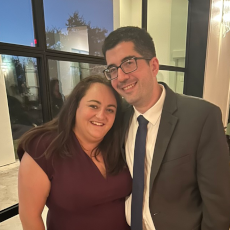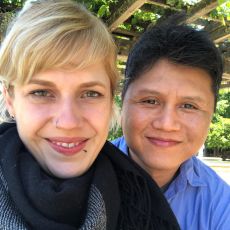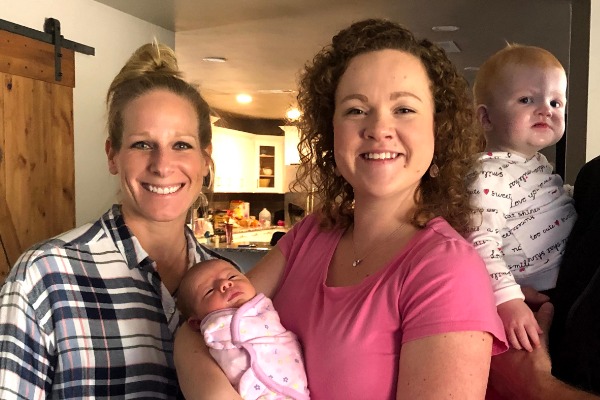Why You Shouldn't Say "Give Up for Adoption"
The Importance of Positive Adoption Language
Here's the truth: Adoption is not "giving up."
“Give up for adoption” is not the best way to positively and realistically speak about the adoption process, even though it's the most common way to talk about adoption. Choosing to give your baby the gift of a family who can provide a world of support and opportunity couldn’t be further from giving up. This is why adoption professionals like American Adoptions prefer different ways of saying “give baby up for adoption” — to better reflect the bravery and selflessness of women who make this unplanned pregnancy choice.
Take Sara, a brave birth mom who chose to place her son for adoption.
“I knew I had done what was best for Theodore. I gave him the best possible future, filled with unconditional love, financial stability, education and so much more,” Sara said. “He has a mommy and daddy who love him more than anything. He has so many family members who can’t get enough of him. The love this child will always know is outrageous.”
Birth moms like Sara are not “giving up” or carelessly “giving away” a baby. So, why do American Adoptions’ website and other adoption websites continue to use this phrase?
You have probably seen this phrase throughout our resources for prospective birth mothers. Know this: Just because our website uses this term does not mean it is one our adoption professionals believe in or use lightly.
So, what are some different ways of saying “give a baby up for adoption?”
Adoption professionals today encourage these other words for “giving up for adoption”:
-
Place a baby for adoption
-
Choose adoption for a baby
-
Make an adoption plan
We always prefer to use these other ways to say “give up for adoption,” but we also want you to understand the inclusion of these terms on our website is a bit more complicated.
Helpful Information
Why American Adoptions Uses This Term
Like many adoption professionals, American Adoptions strives to use the correct terminology for “give baby up for adoption” whenever we can. When you contact our adoption specialists for more information about the adoption process, they will not use this negative adoption language. Instead, they’ll explain why language like “give baby up for adoption” does not represent the truth of an adoption decision. If you are considering adoption, you are considering placing your child with a loving family prepared to give him or her the best opportunities possible.
However, in many adoption materials online, you will find the phrase “giving up for adoption,” despite its negative connotations. This is for a few simple reasons:
-
Many people who are not experienced with the world of adoption frequently use “give up for adoption” rather than one of the more adoption-positive terms listed above.
-
Often, they have heard this phrase used in pop culture and modern society, which tends to present an unrealistic and outdated version of the adoption process.
-
Therefore, if someone is new to the adoption process, they will use this phrase instead of better, alternative phrases for “give up for adoption.” In fact, you may have arrived at this website by using the same phrase yourself.
So, why is “give up for adoption” bad for the perception of modern adoption?
Adoption is much different than it was even a few decades ago. Expectant mothers are never forced to “give up” their baby; they are in charge of their entire adoption process, including choosing an adoptive family and determining what kind of post-adoption contact they want with their child. It’s a selfless decision made from love and bravery — not a selfish or lazy one in which you are “giving away” your child without a second thought.
But, because so many people use this phrase when learning about the adoption process, our educational materials use the common “give up baby” to help them find the information they want. Then, once someone has found our adoption materials, we take the time to explain the reality of the adoption process, why this term is outdated, and other ways to say “give up for adoption” that accurately represent this wonderful journey.
Therefore, if you ever find this phrase on our site, know that it is not one we use lightly or even believe is correct. Instead, we are using the best methods we have to spread awareness about how adoption really works and provide expectant mothers like you the information you need to make the best choice for you.
“You’re not giving your babies up,” said Janelle, a birth mother who chose to give her baby a better life. “You’re just giving them a better life… it’s unselfish, you know? That’s their lives you’re thinking about — it’s not just your life. You’re giving them the opportunity to live the best life that they can, and the life you know that you can’t give them.”
While we’re on the topic of positive adoption language, there are a few other phrases you should be aware of, as well.
“Keep” a Baby
You may be deciding between keeping your baby and placing them for adoption. However, using the phrase “keep” implies that your other option is still a negative one of “giving away.”
Know this: Choosing to place your child for adoption is in no way a worse decision than “keeping” them, which is why we encourage all people talking about adoption to instead use “parent a baby.”
This way, deciding between “parenting a baby” and “placing a baby for adoption” is an fair decision — not one that implies one choice is better than the other.
“Birth Mother/Parent”
As you look at information on adoption, you may also come across the phrase “birth mother” or birth parent.” But, what exactly is a birth parent? Are you one for considering adoption?
A birth mother is a woman who has placed her child for adoption. Only after her adoption is complete should a woman be “officially” called a birth mother — and she can always change her mind about her adoption decision prior to placement.
If you are still considering adoption, you are a “prospective birth mother,” “expectant mother,” or “pregnant woman considering adoption.” However, you always have the right to be called by the title you are most comfortable with. As you pursue your adoption process, make sure your professionals understand what you would like to be called — whether it’s “birth mother,” “first mother” or any of the alternatives listed above — to receive the respect you deserve at this time in your adoption journey.
“[Some people] were not nice to me; they told me I ‘gave my baby away,’ that I didn’t love her, that this was the easy way out. This was not the easy way out,” Lindsey said. “This was way harder than people would think...I knew that what I was doing in placing in Charlotte for adoption was 100 percent out of love. I loved her so much that I had to be selfless.”
Remember, adoption is a defining moment in a woman’s life — but your identity is always more than just your role as a birth mother.
“Real” Parent
It’s normal to have deep-seated maternal feelings about the child you place for adoption. You may even see yourself as your child’s “real” mother because of your genetic connection. People who are not birth mothers also use this term for the same reasons.
However, neither a birth parent nor an adoptive parent is more “real” than the other. Both play important roles in the adoption process, and an adopted child would not have the same life if it weren’t for the interaction and choice of each of these parents. Every parent in the adoption triad is a “real” parent and plays a different role for the child at the center of the adoption, which is why it’s much more helpful and positive to use phrases like “birth parent” and “adoptive parent” when referring to these people.
---
It’s important that all people — not just those involved in adoption — understand why you shouldn’t say “give up for adoption” and use more adoption-positive language. If you are considering adoption for your baby, positive phrasing may actually affect your decision to take this path.
If you ever have questions about how to talk about adoption and whether it’s the right choice for you, please call our adoption specialists for free at 1-800-ADOPTION or click here to get the answers you need.
Disclaimer
Information available through these links is the sole property of the companies and organizations listed therein. American Adoptions provides this information as a courtesy and is in no way responsible for its content or accuracy.








































